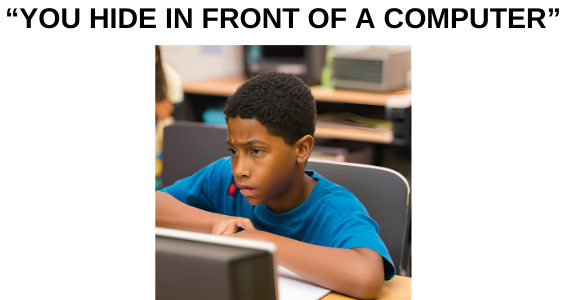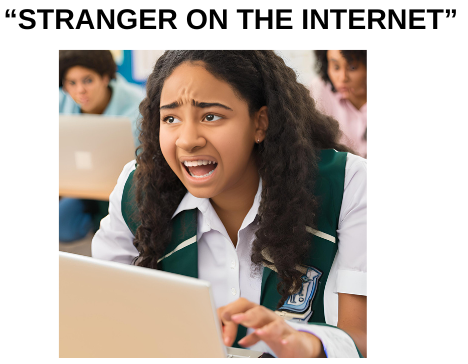Module 11 (Continued)
Cyberspace Anti-Bullying Training – Part 2
Weeks 21-22

What is the theme of this illustration and what could be a hidden message(s) as it applies to bullying? Students write responses in their Student Workbooks.
“YOU HIDE IN FRONT OF A COMPUTER” – Poem
You’re a bully that hides in front of a computer sending out messages of lies, disrespect, and hate.
If you have to hide in front of a computer to bully me, you’re not the least bit brave at all. In fact, you’re a phony and a fake.
I actually feel sorry for you as you hopelessly linger in your pathetic state.
The truth about me or any kid you’re bullying will eventually come out. Truth is frightening for you, isn’t it? Because the truth will seal your fate.
You hide in front of a computer for hours at a time.
Your time would be better spent if you somehow discovered how, with other kids, you could become nice and kind.
You hide in front of a computer to go about your daily sour routine of bullying other kids.
One day your computer will crash and along with it, your despicable bullying empire, too. Just maybe then, you’ll feel somewhat sorry for all the unnecessary bullying you did.
Al Johnson
Remind students: Select your favorite words or phrases in the poem. Copy them onto your “My Favorites” at the end of your workbook! Practice repeating them over and over again, so you are ready to confidently respond to a bully.
“YOU HIDE IN FRONT OF A COMPUTER” VOCABULARY – Discuss the meanings of the following words/phrases, and how they are used in the stanzas of the poem.
- Disrespect
- Phony and a Fake
- Hopelessly Linger
- Pathetic
- Eventually
- Seal Your Fate
- Daily Sour Routine
- Despicable
- Unnecessary
Students are asked to give a written reply to the following: (page 83) “In your opinion, why would anyone choose to send out messages of lies, disrespect, and hate online”?

What is the theme of this illustration and what could be a hidden message(s) as it applies to bullying? Students write responses in their Student Workbooks
“THE STRANGER ON THE INTERNET” – Poem
A stranger on the internet should be treated exactly like the one on the street.
Parents and responsible adults have told kids never to talk to strangers they might meet.
The stranger on the internet is constantly on the prowl, looking for any kid they can convince.
The stranger on the internet knows slick and enticing ways to cause a kid to let down his/her defense.
Kids, if you ever come across a stranger on the internet,
Do not, under any circumstance, chat with them. Conversations with strangers on the internet can only lead to regret.
Quickly tell your parents or any responsible adult about the stranger on the internet.
Hopefully, you can do this while the stranger is still online.
Then, if the stranger is a bad person that commits crimes against kids, maybe the police can catch him/her quickly. They’ll then be the stranger on the internet hopefully, for the very last time.
Al Johnson
Remind students: Select your favorite words or phrases in the poem. Copy them onto your “My Favorites” at the end of your workbook! Practice repeating them over and over again, so you are ready to confidently respond to a bully.
“THE STRANGER ON THE INTERNET” VOCABULARY – Discuss the meanings of the following words/phrases, and how they are used in the stanzas of the poem.
- Prowl
- Convince
- Enticing
- Defense
- Regret
Using their workbooks, instruct students to write a poem or essay about Cyberbullying (Page 85).
REMINDER: Modules 1-16 are followed by a short quiz (in the student workbooks) so students can demonstrate mastery of the lesson. This is followed by a teacher evaluation, taking into consideration various aspects of what the students have learned from that module. Please make special note of any particular accomplishments, improvements made, or areas in need of improvement, FOLLOWED BY YOUR SIGNATURE AND DATE.


